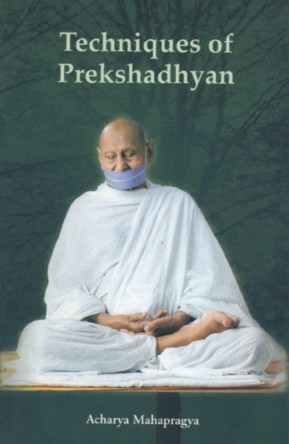Contemplation of Momentariness
This is an exercise of dissociation. Move from gross to subtle. Perceive all kinds of relations. They are all associated. Just see them. Association with everything should not turn into an attachment. Contemplating on association perceive that whatever will be left at last will be only me. Reflect on it again and again.
- Select a Posture
- Mahapran Dhvani (6 times)
- Kayotsarg (5 minutes)
- Recite Arham Dhvani & Dhyey Sutra (Sampikkhae Appagamappaenam)
- Perception & Contemplation
- That you are here in a particular place, is a mere coincidence and inevitable. Every union is followed by disunion. Reflect upon your association with this place. From reflection, come to direct realization. Experience your dissociation from this place.
- That you are here in a particular room is mere coincidence. Everything coming together is followed by separation. Reflect upon your association with this room. From reflection, come to direct realization. Experience your dissociation from this room.
- That you are seated here on a particular mat is a mere coincidence and what is joined is bound to be disjoined. Reflect upon your association with this mat. From reflection, come to direct realization. Experience your dissociation from this mat.
- That a particular cloth covering your body is a mere coincidence and what is joined is bound to the disjoined. Reflect upon your association with the cloth. From reflection, come to direct realization. Experience your dissociation from this cloth.
- That you have inhabited a particular body, is a mere coincidence. Everything coming together is followed by separation. Reflect upon your association with this body. From reflection, come to direct realization. Experience your dissociation from this body.
- The diseases afflicting the body are coincidental and all associations are inevitable followed by dissociation. Reflect upon your association with diseases. From reflection, come to the direct realization. Experience your dissociation from these diseases.
- All psychological complications are a mere coincidence. All that is put together is bound to be apart. Reflect upon your association with psychological complications. From reflection, come to direct realization. Experience your dissociation from these psychological complications.
- All impulses, passions, anger pride, all the irritants are mere coincidence. Separation follows every association. Contemplate upon your associations with all kinds of annoyances. From contemplation, come to direct realization. Experience your dissociation from these impulses and passions.
- All dispositions, habits such as fighting, addiction to drugs etc. are mere coincidences. Disunion inevitably follows every union. Reflect upon your association with various habits. Experience your dissociation from these habits.
- The subtle body from which all emotions originate is a mere coincidence. All that originates is bound to dissolve. Reflect upon your association with the subtle body. Experience your dissociation from all kinds of emotions.
- My consciousness is different from all place, clothing, body, disease, mental complications, habits and the subtle body. All these are coincidental. What is accidental is bound to perish. Reflect upon your association with all these. Experience your dissociation from all these.
- Now, turn back in the reverse order to the point we started from. Reflect upon subtle body, all dispositions, habits, mental complications, diseases, body, cloths, sitting mat, and place. From reflection, come to direct realization.
- "Imam sariram anichcham, imam sariram anichcham, imam sariram anichcham".
The body is transitory. Every moment, many cells are getting destroyed and many cells are generating. Many changes take place in it. - "Ime roga anichcha".
Diseases are transitory. They are not permanent. - "Ime mano roga anichcha".
These mental complications are momentary. - "Ime bhava anichcha".
These passions are transitory.
6. Conclude Dhyan session with recitation of Mahapran Dhvani(6times).
 Acharya Mahaprajna
Acharya Mahaprajna
